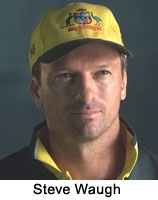The servant leader
Daniel Laidlaw
Steve Waugh. The very name now invokes images synonymous with Australian
cricket: Aggression, mental toughness, fighting spirit and above all,
achievement. So much has already been written about those very traits and
characteristics that it is difficult to find anything original to say. What
has perhaps not been analysed in detail, though, is the style of Waugh's
leadership.
 By any measure, Steve Waugh is a great captain. The results alone support
that title. Since being awarded the Australian captaincy two-and-a-half
years ago, Waugh has led his team to World Cup glory and a record winning
streak of 16 consecutive Tests, although still unable to conquer
subcontinental strongholds Sri Lanka and India. Whether it is entirely
deserving or not, the captain receives the credit or blame for the team's
results and, as such, Waugh can only be commended for his team's achievements.
By any measure, Steve Waugh is a great captain. The results alone support
that title. Since being awarded the Australian captaincy two-and-a-half
years ago, Waugh has led his team to World Cup glory and a record winning
streak of 16 consecutive Tests, although still unable to conquer
subcontinental strongholds Sri Lanka and India. Whether it is entirely
deserving or not, the captain receives the credit or blame for the team's
results and, as such, Waugh can only be commended for his team's achievements.
Judging him by the spirit of his team, Waugh has also distinguished himself
for the unity he has engendered. Although a winning team is naturally a
happy team and vice versa, and taking into account that Australian sportsmen
have an inherent propensity to praise their mates by putting a positive spin
on events regardless of what they really think, the comments that can be
read about Waugh by his players suggest the Australians genuinely are a
closely-knit team.
Tactically, Waugh has developed. From the days of uncertainty and self-doubt
when first handed the one-day captaincy in 1997/'98, Waugh has apparently
learnt that while encouraging contributions from others is important,
ultimately he must listen to his own instincts. He seemed to come of age in
this regard at the last World Cup - when he probably would have been sacked
had Australia failed to progress to the Super Six round - and after the
hiccup in Sri Lanka when he broke his nose in a horrific collision with
Jason Gillespie, which was reported as a defining moment, managed to
transfuse that success into the Test arena from then onwards. Far from being
the conservative on-field general some thought he might be, Waugh has
flourished and commanded the most attacking side in the world. He has
overseen just two draws; both of them heavily rain-affected matches in Sri
Lanka.
The other question mark to be found over Waugh's captaincy appointment was
the less vital but still influential area of public relations. From our
vantage point, Waugh had indeed seemed like a dour and humourless character.
Not for us the witty one-liners team-mates used as testimony to his sense of
humour. Whereas his predecessor Mark Taylor was the affable diplomat, Waugh
was perceived as more the austere autocrat. In such a high-profile and
demanding role, how would he cope?
 That concern was also proved unfounded as Waugh's comportment in front of
the cameras and media has served to enhance his image and give us a more
enlightened insight into his character. Like it or not, the image of the
captain goes a long way towards determining the perception of the team.
Waugh's refreshingly honest approach, at least by sportsmen-to-media
standards, has positively shaped the perception of the Australian team.
That concern was also proved unfounded as Waugh's comportment in front of
the cameras and media has served to enhance his image and give us a more
enlightened insight into his character. Like it or not, the image of the
captain goes a long way towards determining the perception of the team.
Waugh's refreshingly honest approach, at least by sportsmen-to-media
standards, has positively shaped the perception of the Australian team.
All of those are the features of Waugh's captaincy. But how would one define
those characteristics? Under what category do Waugh's leadership methods
fall?
By chance, I was shown a textbook called Supervision: Management in action,
by Kris Cole. In the chapter on leadership, I was surprised to discover
almost all of the attributes of the Servant Leader perfectly matched Waugh's
principles. Steve Waugh is the embodiment of the 21st century leader.
Cole wrote that today we expect leaders to be participative and democratic.
"We expect them to empower their work teams, to coach them and support them.
We expect them to create a sense of purpose, lead the way by example, and
introduce and manage change sensitively. We expect them to innovate and
maintain an unwavering customer focus. We expect them to inspire loyalty,
dedication and commitment. Leaders have become mentors, helpers and coaches.
They are enablers and inspirers." It could have been written about Waugh.
Cole referred to servant leadership writer Robert K. Greenleaf, and a quote
attributed to Jesus: "The greatest of you should be like the youngest and
the one who rules like the one who serves." - Luke 22:26. Cole said that
there are very few leaders who can demonstrate this quality in the real
world, however, and "for this reason, servant leadership is sometimes
thought of as an untested ideal."
In the field of sports leadership, Waugh
has tested that ideal and proven it an unmitigated success.
"In essence, servant leaders help followers to grow and reach their
potential in their job. They release potential and bring out the best in
people." Reading that, one can't help but think of Matthew Hayden, and how
he attributed Waugh's belief in him for the confidence that enabled him to
have a record series in India.
 The attributes of the servant leader describe Waugh's leadership
philosophies with remarkable accuracy. Below are just few attributes of the
servant leader, from Management in Action:
The attributes of the servant leader describe Waugh's leadership
philosophies with remarkable accuracy. Below are just few attributes of the
servant leader, from Management in Action:
* They listen carefully and non-judgementally to others'
thoughts and opinions, and reflect on what they have heard.
* They make informed decisions based not on short-term
benefits for a few but on long-term repercussions (think of Australia's
one-day rotation policy, and Waugh's preparedness to omit leading players to
give the whole squad experience with the 2003 World Cup in mind). This
requires courage and self-denial, since sometimes the best decision will be
unpopular (Waugh has been reported as saying he considers telling players
they have been dropped the hardest part of his job).
* They have and display empathy and compassion.
* They are not concerned with protecting their own position
but with doing what is 'right' according to their own values and standards
(Waugh offered to abdicate the one-day captaincy in 1997 due to his own poor
form and that of the team).
* They are decisive and flexible: having weighed up the
alternatives they commit to a path of action unreservedly while remaining
open to new information.
One important feature of Waugh's captaincy the Servant Leader chapter does
not describe in depth is leadership by example, one of the chief hallmarks
of his tenure and a valuable quality for any cricket captain. Waugh remains
Australia's best batsman and continues to inspire by personal example. He
reinforces his ideal of "backing yourself" by doing just that, utilising
self-belief to consistently face down the best bowlers and rescue his team.
It is one thing to speak about believing in yourself, but when the players
see that faith in one's own abilities lead to success for the man
championing it, how can they help but believe and follow his example?
During Australia's last 18 Tests, commencing with the start of the streak of
16 victories and encompassing the two defeats in India, Waugh remained
Australia's leading batsman, his 6 centuries in that time three more than
the next best. In two of those, Waugh came to the crease when Australia was
three down for less than fifty. And successfully backed himself to overcome.
The servant leader, leading from the front.
More Columns
Mail Daniel Laidlaw